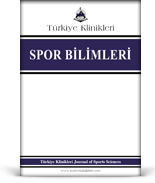Amaç: Rekreasyon, yükseköğretimde yönetimi ve uygulaması 2 farklı fakültede (spor bilimleri fakültesi/turizm fakültesi) okutulmaya çalışılan bir programdır. Bu önemli yapısal sorun göz önünde bulundurulduğunda, rekreasyon lisans programlarının hem sektörün hem de rekreasyon uzmanlarının ihtiyaçlarını karşılayabilecek yeterlilikte olamayacağı sonucuna kolaylıkla ulaşılabilir. Bu duruma ek olarak, müfredatların sektör ihtiyaçları doğrultusunda yapılandırılmamış olması da rekreasyon lisans programlarında okutulan derslerin etkililiği ile ilgili soru işaretleri oluşturmaktadır. Bu bağlamda araştırmanın amacı, rekreasyon lisans programlarında okutulan mesleki derslerin rekreasyon uzmanı yetiştirmedeki etkililiğini belirlemektir. Gereç ve Yöntemler: Araştırmanın evrenini Yükseköğretim Kurumlarındaki rekreasyon programları oluşturmaktadır. Evrenin içerisinden ölçüte dayalı örnekleme tekniği ile Eskişehir, Ankara, Kırıkkale ve Sakarya illerindeki spor bilimleri fakültesi rekreasyon lisans programı belirlenmiş ve toplam 26 öğrenci örnekleme dâhil edilmiştir. Araştırma, nitel araştırma modellerinden biri olan durum çalışması olarak tasarlanmıştır. Rekreasyon lisans programlarındaki derslerin etkililiğine ilişkin veri toplamak için araştırmacılar tarafından geliştirilen yarı yapılandırılmış görüşme formu kullanılmıştır. Araştırma verilerinin analizi için içerik analizi tekniğinden yararlanılmıştır. Verilerin geçerliği ve güvenirliği için ölçüm üçgenlemesi, gözlem üçgenlemesi, uzman incelemesi, ayrıntılı betimleme, kodlayıcılar arası güvenirlik ve teyit incelemesi yapılmıştır. Bulgular: Analiz sonucunda teorik ve uygulamalı derslerin öğrencileri yeterli düzeyde hazırlamadığı, ders işlenişinin ve sunuşunun yeterli olduğu, teorik ve uygulamalı derslerin kısmen mesleğe hazırladığı ve teorik ders içeriklerinin mesleğe hazırlamadığı bulgularına ulaşılmıştır. Sonuç: Rekreasyon lisans programlarındaki ders etkililiğinin yeterli düzeyde olmadığı ifade edilebilir. Ders etkililiğinin geliştirilmesi için teorik bilgi yığınının azaltılması, derslerin teori ve uygulama bileşenlerinden oluşturulmasına özen gösterilmesi ve meslek bilgisi derslerinin kredi ve süresinin artırılması gerekmektedir.
Anahtar Kelimeler: Rekreasyon; lisans programı; ders etkililiği
Objective: In higher education, the only department where management and application are tried to be taught in 2 different faculties (faculty of sports sciences/faculty of tourism) is recreation. Considering this important structural problem; it can easily be concluded that recreation undergraduate programs are not sufficient enough to meet the needs of the sector and recreation experts. The curricula are not structured in accordance with the sector needs, which weakens the effectiveness of lessons taught in the recreation undergraduate programs. In this context, the purpose of this research is to determine the effectiveness of occupational lessons taught in the recreation undergraduate programs on raising recreation experts. Material and Methods: Target population of the research consists of recreation programs in the Higher Education Institutions. Sports science faculty recreation undergraduate programs in Eskişehir, Ankara, Kırıkkale, Sakarya provinces were selected from the population with the criterion-based sampling technique and a total of 26 students were chosen. The research was designed as a case study, which is among qualitative research models. In order to collect data concerning the effectiveness of lessons in the recreation undergraduate programs, a semi-structured interview form developed by the researchers was used. Content analysis technique was used for the analysis of the research data. Measurement triangulation, observation triangulation, expertization, detailed description, intercoder reliability and confirmation examination were performed for the validity and reliability of the data. Results: As a result of the analysis, it was determined that theoretical and applied lessons did not prepare the students enough, the way of teaching and presenting the lessons was sufficient, theoretical and applied lessons partially prepared them to the profession and theoretical lesson contents did not prepare them to the profession. Conclusion: As a consequence, it is possible to state that lesson effectiveness in the recreation undergraduate programs is not sufficient. In order to develop lesson effectiveness, it is required to reduce excessive theoretical knowledge, pay strict attention to including the components of theory and practice in lessons and to increase the credits and durations of professional knowledge lessons.
Keywords: Recreation; undergraduate programs; lesson effectiveness
- Kaya YK. İnsan Yetiştirme Düzenimiz: Pollitika-Eğitim-Kalkınma. 5. Baskı. Ankara: Pegem Akademi; 2009.
- Kaptı SB, Senemoğlu N. Effectiveness of case based curriculum [Vakaya dayalı öğretim programının etkililiği]. Elementary Education Online. 2015;14(3):899-913. [Crossref]
- Şimşek KY. Ticari Rekreasyon. 1. Baskı. Ankara: Detay Yayıncılık; 2018.
- Zorba E, Cerit E, Gümüşdağ H, Evli M. Rekreasyon bölümlerinin tercih edilme nedenleri ve bölüm öğrencilerinin beklentilerinin araştırılması [The reasons of prefered and expectances of the students which study in recreation department]. Akademik Spor Sağlık ve Tıp Bilimleri Dergisi. 2013;8(3):1-14. [Link]
- Ağılönü A, Mengütay S. Yerel yönetimlerde rekreasyon hizmetleri ve model belirleme [A model of recreation services in local government]. Uluslararası İnsan Bilimleri Dergisi. 2009;6(2):161-76. [Link]
- Korkutata A. Amerika ve Türkiye'de rekreasyon öğretim programlarının karşılaştırıl ması [A comparison of recreation curriculum between United States of America and Turkey]. Education. 2017;7(3):515-24. [Crossref]
- Ziyagil MA, Sevimli D. Avrupa Birliği ile uyum sürecinde yükseköğretimde antrenörlük eğitiminin yeniden yapılanması [Reorganizing of sports coaching departments in Turkish higher education system with the integration of European Union]. Beden Eğitimi ve Spor Bilimleri Dergisi. 2013;15(1):9-28. [Link]
- Gedikoğlu T. Avrupa Birliği sürecinde Türk eğitim sistemi: Sorunlar ve çözüm önerileri [Turkish Education System in the European Union Process: Problems and Solution Suggestions]. Mersin Üniversitesi Eğitim Fakültesi Dergisi. 2005;1(1):66-80. [Link]
- GEAR (Güvenlik Eğitimi Araştırma Merkezi). Polis Temel Eğitiminde Sorunlar ve Çözüm Önerileri. Proje Sonuç Raporu. Ankara; 2011. [Link]
- Baki A, Bell A. Ortaöğretim Matematik Öğretimi. Cilt I. Ankara: Yök/Dünya Bankası; 1997.
- Saban A. Öğrenme-Öğretme Süreci. 3. baskı. Ankara: Nobel Yayıncılık; 2004.
- Özden Y. Öğrenme ve Öğretme. 4. baskı. Ankara: Pegem; 2004.
- Senemoğlu N. Gelişim, Öğrenme ve Öğretim: Kuramdan Uygulamaya. 23. Baskı. Ankara: Yargı Yayınevi; 2013.
- Balcı A. Etkili Okul: Kuram, Uygulama ve Araştırma. 1. Baskı. Ankara: Erek Ofset; 1993.
- Gregory LL. Synthesis of the case studies. In: Duckett WR, ed. Why Do Some Urban Schools Succeed? Bloomington, Indiana: Phi Delta Kappan; 1980.







.: Process List